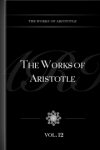The Works of Aristotle (12 vols.)
Digital Logos Edition
Overview
It is impossible to overstate Aristotle’s importance in the development of Western thought. A student of Plato, Aristotle quickly distinguished himself from his teacher by rejecting the theory of forms—the belief that the characteristics of any physical thing (roundness, redness) exist apart from it in an abstract realm of forms. Aristotle taught that forms could not be properly understood apart from the physical objects. After a five-year period tutoring the young Alexander the Great, Aristotle set up his own school, the Lyceum, as a rival to Plato’s Academy.
Aristotle is known as the father of logic. He was the first thinker to establish a system of reasoning. One of his best-known rules of logic is the syllogism: for example, “All men are mortal; Socrates is a man; therefore, Socrates is mortal.” Aristotle was also the first thinker to create classifications for knowledge (e.g. mathematics, poetry, etc.).
Aristotle’s works had a profound influence on Thomas Aquinas. Aquinas held Aristotle in such high regard that he refers to him simply as “the Philosopher” throughout his work.
The digital edition of The Works of Aristotle gives you the kind of intertextual connections that philosophers and theologians have dreamed of for centuries. All 12 volumes are completely indexed and linked across all the other works in your digital library. Jump back and forth between Aristotle and Aquinas with a click. Examine Plato and Aristotle’s similarities and differences with side-by-side textual comparison. The digital edition of The Works of Aristotle will save you time and energy while giving you better access to some of the most important thought in history.
Interested in ancient philosophy? The Works of Aristotle is also available in the Ancient Philosophy Research Library (27 vols.) at a significant discount!

- Near-instant searches across all 12 volumes
- Complete index for each book
- Extensive explanatory footnotes
- Preface by the editor
- Book introductions by the translators
. . . a production of historic magnitude and impact.
—Internet Encyclopedia of Philosophy
- Title: The Works of Aristotle
- Author: Aristotle
- Editors: J.A. Smith and W.D. Ross
- Publisher: Clarendon Press
- Volumes: 12
- Pages: 5,371
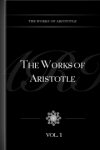
- Categoriae and De Interpretatione (English: Categories and On Interpretation) trans. E.M. Edghill
- Analytica Priora (English: Prior Analytics) trans. A.J. Jenkinson
- Analytica Posteriora (English: Posterior Analytics) trans. G.R.G. Mure
- Topica and De Sophisticsis Elenchis (English: Topics and On Sophistical Refutations) trans. W.A. Pickard-Cambridge
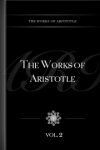
- Physica (English: Physics) trans. R.P. Hardie and R.K. Gaye
- De Caelo (English: On the Heavens) trans. J.L. Stocks
- De Generatione et Corruptione (English: On Generation and Corruption) trans. H.H. Joachim
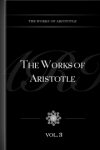
- Meteorologica (English: Meteorology) trans. E.W. Webster
- De Mundo (English; On the Universe) trans. E.S. Forster
- De Anima (English: On the Soul) trans. J.A. Smith
- Parva Naturalia (English: Little Physical Treatises) trans. J.I. Beare and G.R.T. Ross
- De Spiritu (English: On Breath) trans. J.F. Dobson
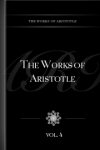
- Historia Animalium (English: History of Animals) trans. D’Arcy Wentworth Thompson
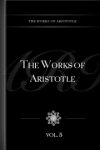
- De Partibus Animalium (English: On the Parts of Animals) trans. William Ogle
- De Motu and De Incessu Animalium (English: On the Motion of Animals and On the Beginnings of Animals) trans. A.S.L. Farquharson
- De Generatione Animalium (English: On the Generation of Animals) trans. Arthur Platt
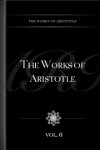
- Opuscula (English: Pamphlets) trans. T. Loveday, E.S. Forster, L.D. Dowdall, and H.H. Joachim
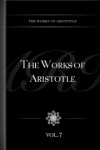
- Problemata (English: Problems) trans. E.S. Forster
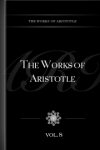
- Metaphysica (English: Metaphysics) trans. W.D. Ross
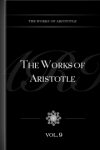
- Ethica Nicomachea (English: Nicomachean Ethics) trans. W.D. Ross
- Magna Moralia (English: Great Ethics) trans. St. George Stock
- Ethica Eudemia (English: Eudemian Ethics) trans. J. Solomon
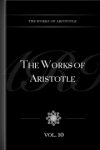
- Politica (English: Politics) trans. Benjamin Jowett
- Oeconomia (English: Economics) trans. E.S. Forster
- Atheniensium Respublica (English: Athenian Politics) trans. Sir Frederic G. Kenyon
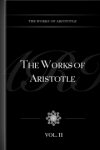
- Rhetorica (English: Rhetoric) trans. W. Rhys Robers
- De Rhetorica Ad Alexandrum (English: Rhetoric to Alexander) trans. E.S. Forster
- De Poetica (English: Poetics) trans. Ingram Bywater
Aristotle (384–322 BC) was born in the Greek colony of Stagirus, on the coast of Thrace. When he was 17, Aristotle went to Athens, where he studied under Plato at the Academy for 20 years. Following the death of Plato, and due to Aristotle's divergence from platonic ideas, Aristotle left the Academy. He was later hired by Philip of Macedonia as a tutor for his son, Alexander (who would grow up to become Alexander the Great). After tutoring Alexander for five years, Aristotle returned to Athens and founded the Lyceum as a rival to Plato’s Academy. Because he was in the practice of walking while he taught, his followers became known as peripatetics, a Greek word meaning “to walk about.”
Known as the father of logic, Aristotle was the first philosopher to develop a system of reasoning. He was also the first to classify human knowledge into specific disciplines (e.g. mathematics, biology, etc.). He is most famous known for rejecting the platonic theory of forms, setting up a dichotomy that has dominated philosophy to this day.
About the Editors
Sir William David Ross (AD 1877–1971) was born in Thurso, Scotland, and spent the first six years of his life in India. He attended the University of Edinburgh, where he graduated with first-class honors in classical studies. He graduated from Baliol College, Oxford, in 1898, with firsts in classics and humanities. In 1900, Dr. Ross accepted a lectureship at Oriel College, Oxford. Dr. Ross served as Provost of Oriel College from 1929 to 1947 and vice-chancellor of the University of Oxford from 1941 to 1944. Dr. Ross served as president of the Aristotelian Society (1939), the British Academy (1936–1940), and the Union Academique Internationale (1947). Dr. Ross was a translator and an eminent moral philosopher in his own right. The Internet Encyclopedia of Philosophy says of Dr. Ross: “It is hard to think of another modern British academic philosopher who similarly distinguished himself not only as a first-rate critic and original theorist, but also as a high-level scholar, educator, editor, translator, administrator, and public official.” Dr. Ross also wrote Aristotle, Plato’s Theory of Ideas, and Kant’s Ethical Theory: A Commentary on the Grundlegung zur Metaphysik der Sitten.
John Alexander Smith (AD 1863–1939) was born in Dingwall, Ross-shire, Scotland. He attended the Univeristy of Edinburgh and Balliol College, Oxford. He graduated with first-class honors in classics and literae humaniores. In 1896 he became a lecturer in philosophy at Balliol College. In 1910 he was appointed Waynflete Professor of Moral and Metaphysical Philosophy at Magdalen College, Oxford, a position he held until 1936. Smith also published Knowing and Acting and The Nature of Art.
Reviews
18 ratings

SEONGJAE YEO
10/5/2019

Kevin Bratcher
6/12/2018
Allan Story
5/5/2017

Unix
1/7/2015
AeliusCicero
6/19/2014
Tammy Snyder
5/17/2014

Allen Bingham
3/28/2014

Marcus Martin
2/1/2014
Michael Maria Waldstein
12/7/2013

Larry Proffitt (I
11/5/2013
